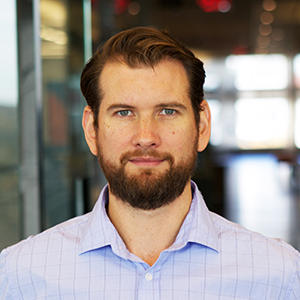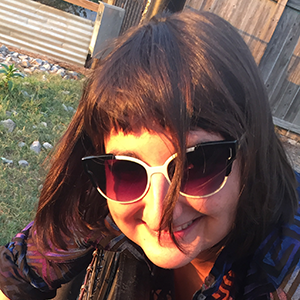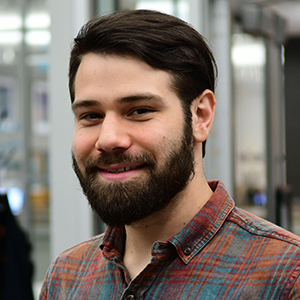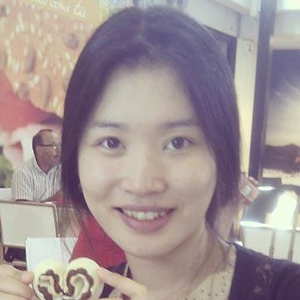On Thursday, April 5 in the Jones Room, the Emory Libraries 2017-18 Woodruff Fellows presented on the work they have done in their fellowships. Following is a brief summary of their presentations.
 Jonathan Coulis is a Ph.D. candidate in Latin American History. For the Subject Librarian fellowship, he worked on a wide variety of projects with the subject librarians. Along with the former Sociology Librarian, Nidia Banuelos, he jointly submitted a proposal to the Library Grants Support Committee and won the Libraries Innovation Grant to launch the Emory Oral History Project. As this project involved recording oral history interviews of the first generation students, they formed a partnership with Emory’s 1915 Scholars Program. Jonathan also worked with Phil MacLeod, the Spanish, Portuguese, and Latin American Studies Librarian, on a collection development/assessment project. Apart from these two projects, he helped Chella Vaidyanathan and Katie Rawson with coordinating the logistics for the November train-the-trainers HathiTrust Workshop called Digging Deeper, Reaching Further. At present, he is completing a LibGuide for Environmental History. He shared his experience as a Subject Librarian Fellow.
Jonathan Coulis is a Ph.D. candidate in Latin American History. For the Subject Librarian fellowship, he worked on a wide variety of projects with the subject librarians. Along with the former Sociology Librarian, Nidia Banuelos, he jointly submitted a proposal to the Library Grants Support Committee and won the Libraries Innovation Grant to launch the Emory Oral History Project. As this project involved recording oral history interviews of the first generation students, they formed a partnership with Emory’s 1915 Scholars Program. Jonathan also worked with Phil MacLeod, the Spanish, Portuguese, and Latin American Studies Librarian, on a collection development/assessment project. Apart from these two projects, he helped Chella Vaidyanathan and Katie Rawson with coordinating the logistics for the November train-the-trainers HathiTrust Workshop called Digging Deeper, Reaching Further. At present, he is completing a LibGuide for Environmental History. He shared his experience as a Subject Librarian Fellow.
Jonathan Coulis – “This fellowship has provided me with a variety of valuable experiences and skills to feel qualified for different professional positions moving forward. I have engaged widely, participating in and helping host digital workshops, assisting with collection management, budgeting, international ordering, and developing LibGuides.”
Read more about Jon here.
———
 Lily Levy, a Ph.D. candidate in Philosophy, is the 2017-18 Outreach and Education Fellow, a position that involves working at both the Emory Writing Center and with Woodruff Library’s Outreach & Education Team. Lily organized six Dissertation Boot Camps for the graduate students from whom she received positive feedback on the exit surveys. She also assisted the Outreach and Education Team with the Academic Showcase, the Horror Haiku Contest, the Pet Therapy study break and the International Students Coffee Hour.
Lily Levy, a Ph.D. candidate in Philosophy, is the 2017-18 Outreach and Education Fellow, a position that involves working at both the Emory Writing Center and with Woodruff Library’s Outreach & Education Team. Lily organized six Dissertation Boot Camps for the graduate students from whom she received positive feedback on the exit surveys. She also assisted the Outreach and Education Team with the Academic Showcase, the Horror Haiku Contest, the Pet Therapy study break and the International Students Coffee Hour.
Besides her work tutoring at the Writing Center, Lily also worked on a project which involved researching graduate writing support offered at twenty peer institutions. She found that very few institutions use the Boot Camps format that Emory University has. She suggests having more outward focused support for graduate students and offering financial incentives for participants.
Read more about Lily here.
——–
 Matt Graci, a Ph.D. candidate in Psychology, has been the Digital Humanities fellow for the Emory Center for Digital Scholarship. This position has allowed him to develop skills outside of his personal research which focuses on autobiographical memory, giving him the opportunity to expand the domain of storytelling from the personal to the professional. He discussed his primary role as associate editor for the open-access, multimedia Atlanta Studies digital publication, as well as his increasingly expansive investigation using Google Analytics to uncover important website descriptives (e.g., the size of our audience, who they are, how engaged they are, & where they come from) for both the Atlanta Studies digital publication and other projects at ECDS. Matt’s next adventure will be a post-doc Insight Data Science fellowship.
Matt Graci, a Ph.D. candidate in Psychology, has been the Digital Humanities fellow for the Emory Center for Digital Scholarship. This position has allowed him to develop skills outside of his personal research which focuses on autobiographical memory, giving him the opportunity to expand the domain of storytelling from the personal to the professional. He discussed his primary role as associate editor for the open-access, multimedia Atlanta Studies digital publication, as well as his increasingly expansive investigation using Google Analytics to uncover important website descriptives (e.g., the size of our audience, who they are, how engaged they are, & where they come from) for both the Atlanta Studies digital publication and other projects at ECDS. Matt’s next adventure will be a post-doc Insight Data Science fellowship.
Read more about Matt here.
——-
 Grace Park, a Ph.D. candidate in Political Science, has been the Data Services fellow at the Emory Center for Digital Scholarship, providing consultations and support to undergraduates, graduates and scholars. She has worked to help them locate, clean and analyze data for different research designs. She admits that at first it was a challenge to help students from disciplines outside of the social sciences. But this challenge helped her learn about other types of data, such as event data and lab experimentation data. It was satisfying to be able to figure out how to clean up data that people had obtained from different data sets using a variety of data programs (SAS, SPSS, STATA, etc.). One challenge, in particular, was having to merge nine datasets from four different sources — datasets that had no identifiers in common. After much trial and error, she used the program R to accomplish this goal.
Grace Park, a Ph.D. candidate in Political Science, has been the Data Services fellow at the Emory Center for Digital Scholarship, providing consultations and support to undergraduates, graduates and scholars. She has worked to help them locate, clean and analyze data for different research designs. She admits that at first it was a challenge to help students from disciplines outside of the social sciences. But this challenge helped her learn about other types of data, such as event data and lab experimentation data. It was satisfying to be able to figure out how to clean up data that people had obtained from different data sets using a variety of data programs (SAS, SPSS, STATA, etc.). One challenge, in particular, was having to merge nine datasets from four different sources — datasets that had no identifiers in common. After much trial and error, she used the program R to accomplish this goal.
Read more about Grace here.
